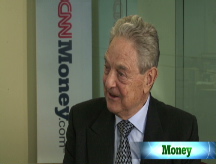Soros: Global investing's godfather
George Soros retired as a multibillionaire. But now he's back, hedging his wealth against what he calls the worst economic crisis in 75 years.
 |
| Soros: "Understand that you may be wrong, especially when you believe too firmly that you're right." |
| MMA | 0.69% |
| $10K MMA | 0.42% |
| 6 month CD | 0.94% |
| 1 yr CD | 1.49% |
| 5 yr CD | 1.93% |
(Money Magazine) -- Broke and friendless in postwar London, having just spent his last penny on food, 22-year-old George Soros made the first of a lifetime of prescient economic calls. "I have touched bottom," he told himself, "and I am bound to rise."
As it turned out, the Hungarian-born survivor of both Soviet and Nazi occupations would do more than merely rise. He would parlay an uncanny flair for anticipating global economic trends into one of the great investing records of all time - not to mention a fortune estimated at $9 billion.
Soros retired in 2000 from running hedge funds and delegated control over a large part of his endowment fund to outside managers. But when subprime defaults began to ricochet around the world, he decided, at 77, to start investing again and to put his take on the crisis into a book, "The New Paradigm for Financial Markets." He recently spoke to managing editor Eric Schurenberg.
Question: In your 50 years in finance you've seen any number of crises. Why is this so bad?
Answer: Because two bubbles are deflating at once. There's the collapse of housing prices, of course. On top of that there's the end of what I call the superboom of credit expansion that has been going on for 25 years. That was made possible by a stable global financial system in which the dollar was the world's primary currency. Now, for many reasons, the system is in question and nothing has taken its place. That has created great uncertainty.
Q. And for us regular people it means...?
A. The days of rapid financial wealth creation are over. We're now in a period of wealth destruction. It is going to be very hard to preserve your wealth in these circumstances.
Q. Don't feel you have to sugarcoat your answer just for my sake.
A. Since the 1980s, the global financial system has been dominated by an ideology I call market fundamentalism - the idea that markets are perfect and regulations are always flawed. But markets aren't perfect. Left to their own devices, they always go to extremes of either euphoria or despair. The Federal Reserve and other regulators should recognize this, since they've had to bail out the markets in crisis after crisis since the 1980s.
Q. Can't the Fed just bail us out again?
A. The Fed's first duty is to prevent the financial system from collapsing. It's shown it can do that, and the markets are breathing a sigh of relief. But we can't avoid the fallout in the real economy. We're facing not only recession but also inflation and a flight from the dollar. To fight recession, the Fed needs to increase the money supply, but that only makes the dollar weaker and inflation worse. That's why I think this crisis is so serious. The Fed's power to intervene is limited.
Q. Where is your money now?
A. Mostly in my endowment fund, a good portion of which I had farmed out to other money managers. When I saw what I considered the most serious financial crisis of my lifetime, I came out of retirement and set up an account to hedge their positions.
Q. How?
A. I went short [bet against] the dollar, U.S. and European stocks and Treasury bonds. I went long [invested in] emerging markets. That worked last year, but this year bonds kept going up and emerging markets down. So I'm about even.
Q. Should Money readers do the same?
A. You'd have to be pretty nimble. I think most investors would be best off in safe, inflation-indexed Treasuries, even though they're quite expensive now.
Q. Growing up in Nazi-occupied Hungary must help you keep today's risky markets in perspective.
A. I'd agree that the prospect of extermination was a formative experience for me. [Laughs.] The Nazis taught me that the abnormal can become normal.
Q. And the lesson in that?
A. It's important in life and in investing always to question yourself. Understand that you may be wrong, especially when you believe too firmly that you're right.
Q. Have your billions made you happy?
A. I'm reasonably happy, but the money's not the point. It's an indication that I've succeeded in the grand adventure of understanding reality. ![]()
Ben Stein: What, him worry?
Marshall Goldsmith: Succeed more by winning less
Dan Ariely: Why you're a big sucker
Daniel Solove: You are your Web reputation


